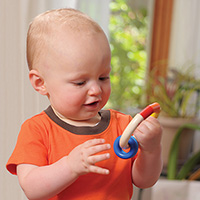
"...the mind of the child in infancy is different from ours, and we cannot reach it by verbal instruction,..."
—Maria Montessori, The Absorbent Mind
 What a baby learns without conscious thought (intent) is absolutely amazing! Parents watch this miracle happen on a daily basis. In just ten to twelve months, an infant is no longer a baby, but a toddler. The changes are dramatic. In that short time, the little human has begun to communicate, and so much more. He will soon be walking and talking.
What a baby learns without conscious thought (intent) is absolutely amazing! Parents watch this miracle happen on a daily basis. In just ten to twelve months, an infant is no longer a baby, but a toddler. The changes are dramatic. In that short time, the little human has begun to communicate, and so much more. He will soon be walking and talking.
Across all cultures, the stages of human development are predictable and universal. Maria Montessori described the first stage of development (from birth to six years) as "the absorbent mind." During the first three years, babies and toddlers unconsciously take in, or absorb, the whole of the environment. Children naturally learn from the world and their specific culture without being directly taught during this period. As cognitive ability develops around the age of three, learning becomes more conscious.
Parents and caregivers supply the important basics. These basics include food, clothing, shelter, and safety, along with love and nurturing. Human contact is mandatory for a child to thrive and grow.
We have all heard that infants raised in cribs with minimal human touch fail to thrive. Caring human interactions are as vital for the growth and security of a child as food and shelter. Communication and human touch are basic needs of all human beings.
Your infant is exposed to the unique culture of your family, along with your neighborhood, community, and country. Specific languages and customs are learned. Your child will unconsciously adopt the sounds and expressions necessary for communication as you talk, sing, explain, touch, and cuddle.
Observe a baby just week's old responding excitedly to the expressions and voices heard since birth. So much is automatically assimilated. As your child grows and becomes mobile, step aside and watch the natural learning. Of course, you'll give assistance at times and provide a safe environment, but it's impossible to teach directly. Your child will pull up, plop down, take a few steps, fall and repeat the process endlessly until one day he walks.
Routine lets a child know what to expect from a very early age. When placed in the high chair, she knows it's time to eat. Hearing the voice of her father or mother say, "Hello, " elicits an immediate response. The expectations and responses are learned from repeated exposure. For example, you might always sing the same song before a bath, or practice a certain ritual at bedtime, like reading a book, singing, or snuggling. Observe how your child may be bewildered or upset if the routine is interrupted.
A child can absorb a negative experience as easily as a positive one, so it is up to caretakers to be aware of what the baby is exposed to. We historically have assumed that small children are clueless about what is being said or done. If that were the case, they would not learn to speak our language! To the contrary, it is all being absorbed. Model the behavior and language you wish to see—even a tone of voice or mood will be unconsciously understood and absorbed.
We want to be positive role models, filling the world with courteous and kind behavior. Respect for your child is also beneficial and makes parenting easier. Rather than looking at the infant as a helpless, needy creature or a burden, try politely conversing with him as you would to any friend.
Your parental caring, nurturing, and enjoyment will help maximize the absorbent mind's natural sensory-motor development. Remember to:
"During the first two years of his life a child prepares with his absorbent mind all his individual traits even though he is not himself aware of this."
—Maria Montessori, The Discovery of the Child
—by Jane M. Jacobs, M.A., Montessori Educational Consultant at Montessori Services. She is a trained primary Montessori directress and also a Licensed Marriage and Family Therapist. She has taught children aged 2 to 7 years in Montessori schools, Headstart, and also in a preschool for children with developmental challenges. In her counseling practice, she helps individuals, couples, and families.
—Originally Published 2019